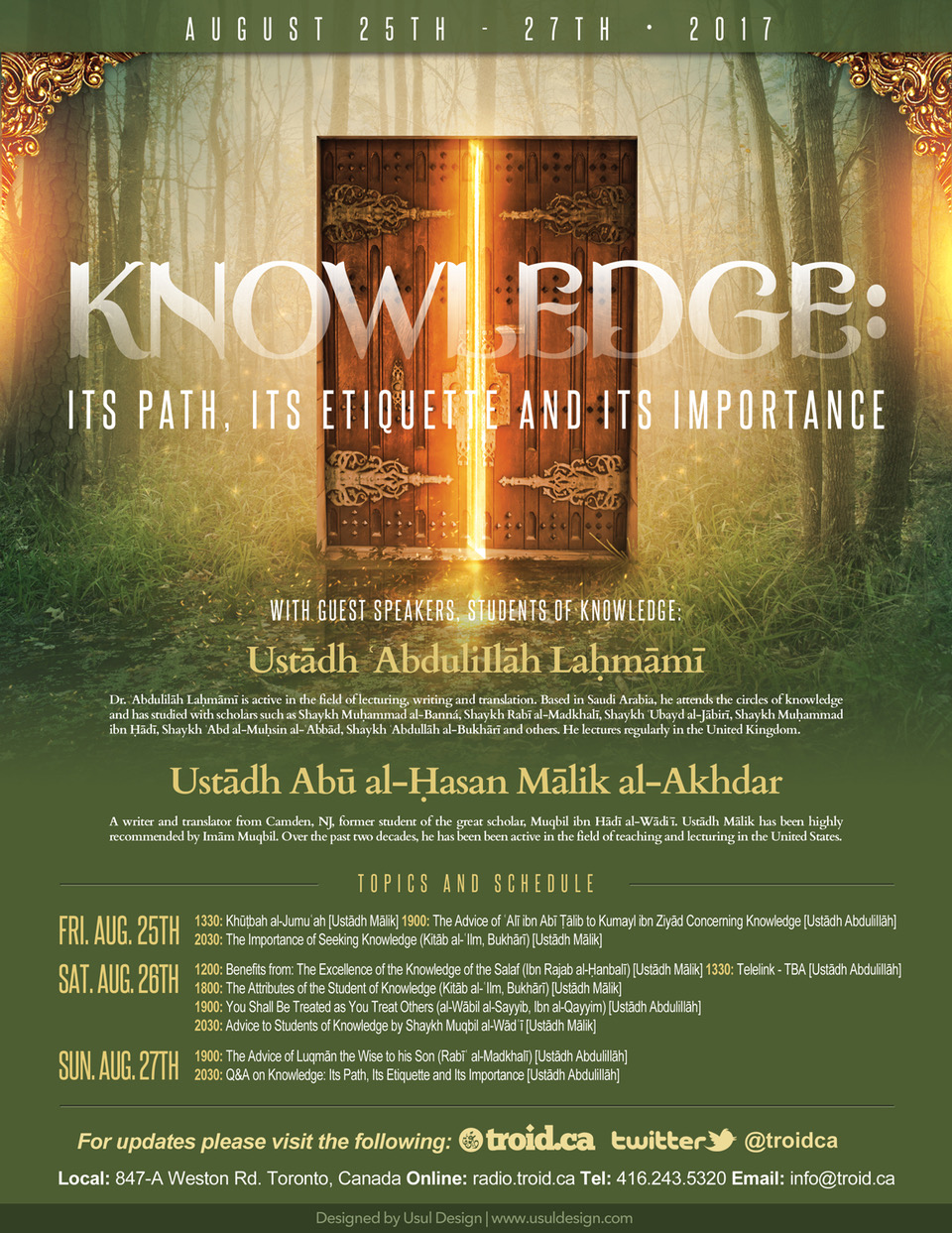From the tremendous reminders of Shaykh Muqbil (raḥimahullāh) mentioned by Ustādh Abū al-Ḥasan in relation to ʿilm and the students of knowledge:
- The Prophet (ṣallallāhu ʿalayhi wa-sallam) said, and it is recorded in Ṣaḥīḥ al-Bukhārī and Ṣaḥīḥ Muslim, ‘Whomsoever Allāh wishes good for, He gives him understanding of the religion.’
- The knowledge discussed in this narration is the knowledge of Sharīʿah; legislation and revelation.
- Both Shaykh ʿAbd al-ʿAzīz ibn Bāz and Shaykh Muqbil (raḥimahumAllāh) mention that the opposite can also be understood: Whomsoever Allāh does not wish good, He does not give him understanding of the religion.
- The Prophet (ṣallallāhu ʿalayhi wa-sallam) urged and encouraged his Ummah towards the attainment of knowledge, and indeed from the most noble of these sciences is knowledge and memorisation of the Book of Allāh.
- It is important to read through the biographies of the scholars and learn their lives and what they put forward by way of efforts in exhortations and the books and works they produced as well as the students they taught. This is because in these biographies we find that many of them memorised the Qurʾān at a young age.
- We should give due diligence to the memorisation of Qurʾān and learn its proper recitation, reciting it with tartīl.
- Ibn Abī Hākim in his biography, it is mentioned that he memorised the Qurʾān at the age of 10 and his father would not allow him to sit in the circles of ḥadīth until he had memorised the Qurʾān.
- The most noble of knowledge is memorisation of the Book of Allāh.
- We live in a time of many distractions which takes our minds away from that which is more important, from these distractions are the likes of smart phones, social media, computer games; it is a must that we are mindful of our children, for indeed it is as the Messenger (ṣallallāhu ʿalayhi wa-sallam) said: ‘All of you are shepherds and are responsible for your flock’, and you will be questioned regarding them so be mindful of your children; raise them striving to learn the dīn of Allāh.
- Regarding the ḥadīth of Muʿāwiyah al-Saḥmi: “I had some sheep which I kept between Uhud and Juwaniyyah with a slave-girl to look after them. One day, I went out to check on my sheep and discovered that a wolf had devoured one of them. Since I am just a human, (I became angry) and struck the girl. Later on, I came to the Prophet (ṣallallāhu ʿalayhi wa-sallam) and reported to him the incident. He terrified me with the gravity of my action. I said, ‘Messenger of Allāh! Shall I free her (as an expiation of my sin).’ He said ‘Call her over’. When I did, he asked her, ‘Where is Allāh?’ She said, ‘Above the heavens’. Then he asked her, ‘Who am I?’ She said, ‘The Messenger of Allāh (ṣallallāhu ʿalayhi wa-sallam).’ Thereupon, the Messenger of Allāh (ṣallallāhu ʿalayhi wa-sallam) ordered me, ‘Free her. She is a believer’; Shaykh Naṣir al-Dīn al-Albānī (raḥimahullāh) mentioned that the slave girl was far from the sittings of knowledge, tending to the flock and herbs, yet when asked about matter of creed she knew the answer. The Companions gave tremendous importance to knowledge.
- Many scholars of ḥadīth and fiqh were scholars of Qirāʿah, such as Dāruqutnī (rāḥimahillāh).
- The scholars gave great diligence and focus to the Book of Allāh, not only in its memorisation but also in its tajwīd and tafsīr.
- From the scholars of tafsīr are the likes of al-Ṭabarī, ibn Kathīr, Imām al-Baghawī and more recenlty Shaykh Nāṣir al-Saʿdī (raḥimahumallāh), and other than them.
- Knowledge of the Qurʾān is from the most noble of science, as opposed to what the people of rhetoric who say that the best of sciences is the science of kalām as they are able to create discussions regarding Allāh and His Attributes.
- Ahl al-Sunnah describe Allāh with that which He describes Himself with in the Qurʾān, and with that which the Messenger of Allāh (ṣallallāhu ʿalayhi wa-sallam) describes him with in the Sunnah.
- As for the rhetoricians, then they fell in to grave error by discussing these matters by way of rhetorical speech, and this is ignorance from them as it relates to the Book of Allāh and the Sunnah of the Messenger (ṣallallāhu ʿalayhi wa-sallam)
- Ibn Rajab (raḥimahullāh) mentions that knowledge that doest not benefit is from ignorance, and it is better to be ignorant of those types of knowledge than it is to have knowledge of them.
- Imām al-Shāfīʿī (raḥimahullāh) said, marvelling upon the people of rhetoric, ‘They should be taken around the souq and beaten before the people’.
- Ibn Rajab (raḥimahullāh) said regarding those who question how Allāh descends in the last third of the night due to different time frames around the world, if the Companions and the Salaf would have heard the likes of this speech they would not have debated with this kind of individual, rather they would have punished him for his speech and counted him from among the mukhalifīn, mukadhibīn and the munāfiqīn. It is said that this is the recompense for those who trade off the likes of rhetoric for the Book of Allāh and the Sunnah of the Messenger (ṣallallāhu ʿalayhi wa-sallam).
- The most noble and superior of sciences is the Book of Allāh and the Sunnah of the Messenger (ṣallallāhu ʿalayhi wa-sallam) from its proper sources.
- Allāh says in the Qurʾān:
۞ يَرۡفَعِ ٱللَّهُ ٱلَّذِينَ ءَامَنُواْ مِنكُمۡ وَٱلَّذِينَ أُوتُواْ ٱلۡعِلۡمَ دَرَجَـٰتٍ۬ۚ
“Allāh will exalt in degree those of you who believe and those who have been granted knowledge”.
[Sūrah al-Mujādilah 58:11]
- Ibn Hajr al-Asqalānī (raḥimahullāh) in Fat`ḥ al-Bārīʾ mentions that the scholars have said that in this āyah there is double virtue for the people of knowledge because Allāh says those who believe and those who have been endowed with knowledge will be raised in degree.
- We must be mindful by what is intended by knowledge here, and that is the knowledge that is praiseworthy and brings fear of Allāh.
- Shaykh Muqbil (raḥimahullāh) would often mention that the likes of Bukhārī and Muslim and others from that period of time were great huffāẓ. Do we have the likes of this today? Even though we have different means of aiding memorisation like video and audio and so on. The point he was making is that these means are not more beneficial than the means and modes of memorisation utilised in by these great schoars.
- Shaykh al-Albānī (raḥimahullāh) said: ‘the computer makes the student ignorant’, i.e. those who depend upon computers rather than doing research and memorising.
- Imām Aḥmad (raḥimahullāh) mentioned that if you have not memorised 300,000 narrations then you are not from the people of knowledge
- Narrated by ʿUthmān ibn ʿAffān, the Messenger (ṣallallāhu ʿalayhi wa-sallam) said: ‘The best of you are those who learn Qurʾān and teaches it.’ Many today complain that they cannot find one to teach them the Qurʾān. Those who have learnt and have knowledge of the Qurʾān should make an effort and find the time to teach others.














